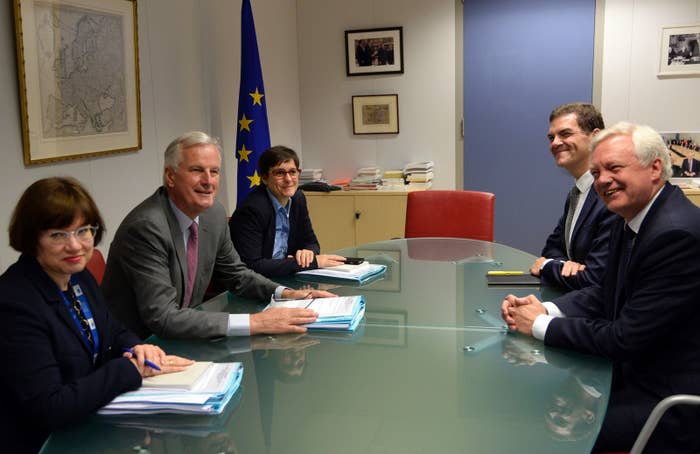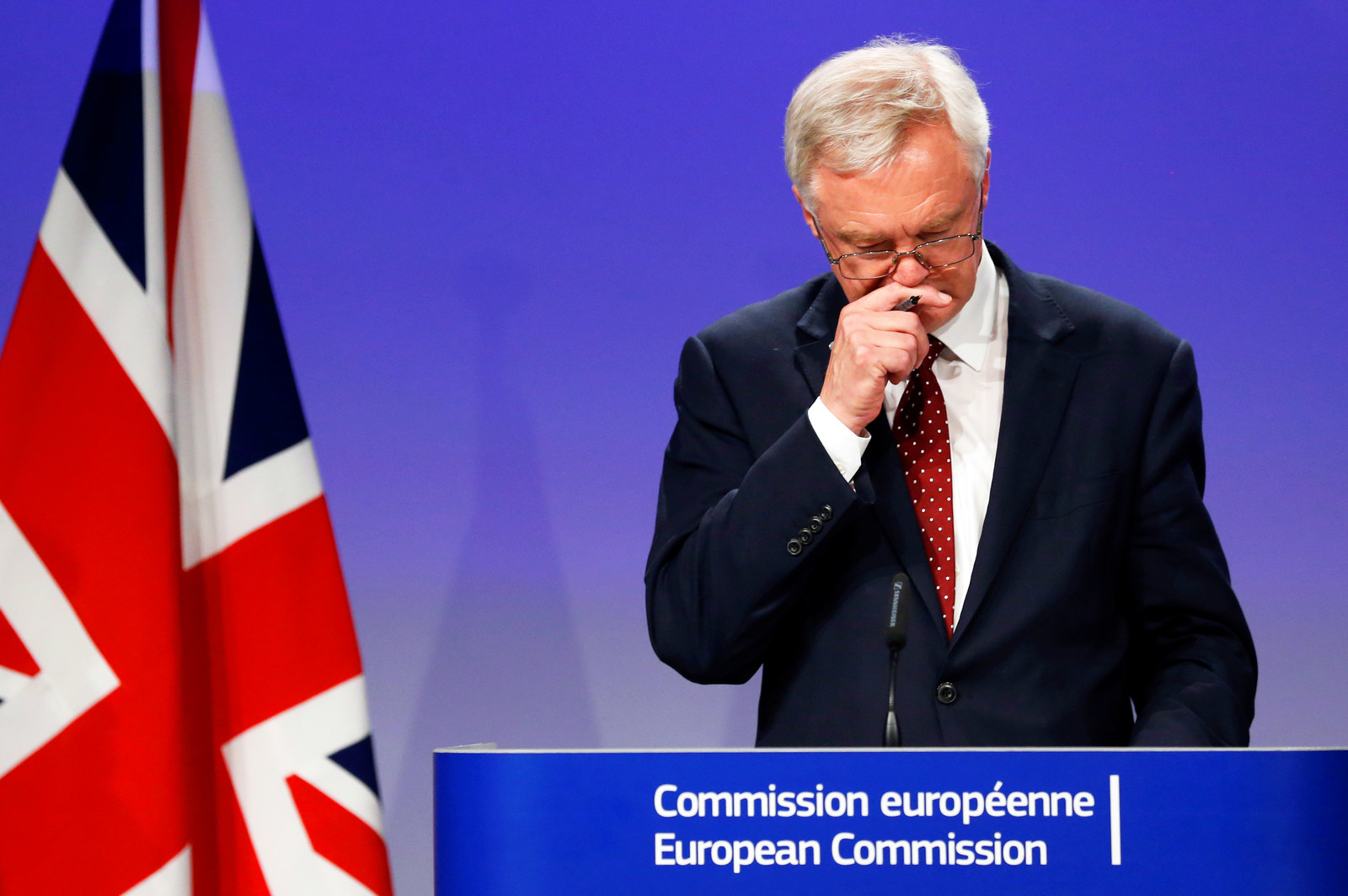
Theresa May’s government unveiled its plan on Tuesday for new customs arrangements with the European Union after Brexit – the first part of a concerted attempt by ministers this week to change the narrative around their handling of Britain's withdrawal from the bloc by laying out more detailed plans.
The UK will in effect seek a temporary extension of the current customs arrangements to avoid disrupting trade, in what will be seen as a victory for proponents of a "softer" Brexit. It would mean that Britain couldn't bring new trade deals with non-EU countries into effect for several years after leaving the EU – a development that would be deeply unpopular with Leave supporters.
The paper outlines two possible options for customs relations with the EU after the interim phase.
One future scenario would involve the UK and the EU entering “a partnership”, aligning their customs approaches in a way that removes the need for a UK-EU customs border.
Under this option, the EU and the UK would apply the same rules and tariffs on goods, including on imports into the UK destined for EU markets. However, as a third country, Britain would be free to set its own arrangements for goods that remain in Britain as well as tariffs and standards for UK exports outside the EU.
The UK government acknowledges that the partnership would be an “innovative and untested approach”.
Another proposal the UK is putting forward would create a new customs border while "streamlining and simplifying requirements to the fullest extent possible through negotiated and unilateral facilitations which reduce and remove barriers to trade".
According to the proposals published on Tuesday, these new mechanisms and technology-based solutions would mean goods do not need to complete paperwork each time they cross a new border and for most goods to be cleared faster at borders and ports.
Meanwhile, officials briefed reporters that the government was already implementing a new IT customs system to handle the new regime. The system, the officials said, was on track to be ready by January 2019.
But the same officials were unable to provide details of the cost of the new systems and processes, nor estimates of how many people would need to be hired and trained to work on customs related issues, such as border controls and checks. It is also not clear what would happen to the UK's plans if the roll out of the new systems were delayed beyond any agreed transitional phase.
Any transitional customs arrangement and future deal will have to be agreed with the EU's other 27 member states.
The proposals were immediately dismissed as fantasy by Guy Verhofstadt, the European parliament's Brexit coordinator.
To be in & out of the Customs Union & "invisible borders" is a fantasy. First need to secure citizens rights & a financial settlement
The European Commission welcomed the proposals, but insisted that "frictionless" trade with the EU was impossible if the UK left the single market and customs union.
A spokesperson said the publication of position papers by the UK would be a "positive step towards now really starting phase one of the negotiations" — two months after the talks formally began — but said it's not prepared to discuss new customs arrangements until other matters have been resolved.
The quicker #UK & EU27 agree on citizens, settling accounts and #Ireland, the quicker we can discuss customs & future relationship.
“We take note of the UK’s request for an implementing period and its preferences as regards the future relationship, but we will only address them once we have made sufficient progress on the terms of the orderly withdrawal,” the spokesperson added. "An agreement on a future relationship between the EU and the UK can only be finalised once the UK has become a third country."
In the paper on Tuesday, the government confirmed that Britain will formally leave the EU's customs union when it leaves the EU in March 2019, despite business lobbyists and opposition MPs arguing that Britain would be economically better off if it stays in the customs union after Brexit.
May declared in a landmark speech in January, when she first set out her vision for Brexit, that Britain will have to leave the EU's single market and customs union in March 2019, and this remains government policy.
But the UK will ask the EU to agree to a "temporary customs union" that would effectively prolong much of the status quo for a limited period of time, so that trade between the UK and the other member states can continue with as little disruption as possible until a new British customs regime is fully in place, the Department for Exiting the European Union (DExEU) said on Monday night.
The details of these transitional arrangements are to be negotiated.
BuzzFeed News understands that the government’s intention is to negotiate and sign trade deals during the interim phase but these would not actually come into force until the temporary transition period is over.
On Tuesday, the government also revealed that it will initially seek to keep in place existing EU free trade agreements and other arrangements the EU has with countries around the world. According to analysis by the Financial Times there are more than 750 such agreements.
The government also announced that it will legislate for a new customs regime by March 2019 to give the UK powers to operate standalone customs, VAT and excise systems after Brexit. The Customs Bill will also cover provisions for a “no-deal” scenario, which would see trade with the EU handled in the same way as relations with non-EU countries meaning that Customs duty and import VAT would be due on EU imports, traders would need to to be registered and would have to submit export declarations and in some cases seek export licenses.
This week’s paper is the first in a series of documents the UK government will be publishing ahead of the next rounds of talks with EU officials in August and September. In addition to setting out its ambitions for the future relationship, the government is also expected to soon release its positions on pending withdrawal matters.
David Davis, the Brexit secretary, said: "The approach we are setting out today will benefit both the EU and UK and avoid a cliff-edge for business and individuals on both sides.
"The way we approach the movement of goods across our border will be a critical building block for our independent trade policy. An interim period would mean businesses only need to adjust to a new regime and allow for a smooth and orderly transition."
In recent weeks, the government has been accused of being underprepared for the monumental negotiations. The general election severely undermined May's authority and cast into doubt whether the prime minister's "hard" vision for Brexit would remain the government's approach. A series of apparently contradictory statements by ministers left the impression that her cabinet is deeply divided about what to do.
The sense of unreadiness reached its peak when Davis was photographed at the start of the latest round of negotiations, in mid-July, without any documents in front of him, in contrast to his seemingly well-prepared counterparts. In Brussels, European politicians are said to be so flummoxed by the UK's lack of preparedness that some figure it has to be a trap, according to a recent story in Politico.
Eager to take back control of the narrative, the UK says it will publish several papers this week about the future relationship with the EU, giving clarity about its position on several important aspects of the negotiations.
Chris Leslie, a Labour MP who supports remaining in the EU, said the government was still trying "to have its cake and eat it" by claiming that it can have frictionless trade with EU states while being outside the customs union.

The paper on the customs union will be followed by another on Wednesday setting out the UK’s views on the dilemma of the Irish border. May is still on holiday in Europe until later in the week, but her government is desperate to show that it has a handle on Brexit ahead of the next round of talks with the European Commission later in the month.
May’s broad approach to Brexit has been clear since her speech at Lancaster House in January, but a lack of specific detail – along with the apparent disagreement among cabinet ministers on opposite sides of the Brexit debate – has led many to question whether the UK is as prepared as it needs to be for such a monumental negotiation.
A “huge body of work … has been undertaken across government since last summer,” DExEU said in a statement late on Monday night. By showing the results of some of that work in the next few days, the government hopes to quieten its critics, give assurance to various groups making competing demands, and accelerate progress in the Brexit talks.
The government is caught in a tricky position politically between satisfying those who voted Leave in the expectation that the UK would “take back control” of its legal and economic affairs on day one and those who believe the status quo will have to be extended for several years to avoid an economically catastrophic jolt.
The political bind will be evident in Tuesday’s paper on the customs union.
At one level, withdrawal from the customs union will be portrayed as a great opportunity for Britain to increase its prosperity by forging new trade links with countries outside Europe. Dig into the detail, though, and the complexity is quickly apparent.
Adopting a short-term compromise would mean British importers and exports aren’t hit by a sudden change that would badly damage their businesses. Meanwhile, UK authorities would have more time to carry out the complicated, technical work of implementing a wholly new customs system.
Under the EU’s customs arrangements, all members apply the same standards and tariffs to imports and exports, and trade deals with non-EU countries are negotiated not by individual governments but centrally by officials in Brussels.
Leaving the union will allow the UK to pursue a trade policy that will make it stronger, fairer, more prosperous, and more outward-looking, by tapping into markets beyond Europe, DExEU said. At the same time, the government insists it will still be able to have “frictionless” trade with the EU from outside the union – an assertion that has been contradicted by Europe’s top negotiator, Michel Barnier.
Tom Brake, the Liberal Democrats' Brexit spokesman, said the interim arrangement would only temporarily delay the disruption of withdrawing from the customs union. The Lib Dems have campaigned to stay in the single market and customs union.
"We still face the prospect of more red tape for businesses, longer queues at our borders and higher prices for consumers once the transition comes to an end," Brake said.
Josh Hardie, deputy director-general of the CBI, the business lobby group, said companies would welcome more clarity from the government. "But the clock is ticking and what matters now is giving companies the confidence to continue investing as quickly as possible,” he added.
British ministers are keen to move beyond the first stage of talks and to start discussing the UK’s long-term economic relationship, which they envision will be underpinned by a sweeping free-trade deal.
The EU has different priorities. The commission insists that Britain will have to resolve the terms of its withdrawal – including a “divorce bill” to resolve its financial commitments, the rights of expats, and the status of the border between Ireland and Northern Ireland – before the talks can progress to transitional arrangements or a long-term relationship.
The UK's thinking is that the talks so far have shown that the shape of the future relationship needs to be clear in order for negotiations to progress.

